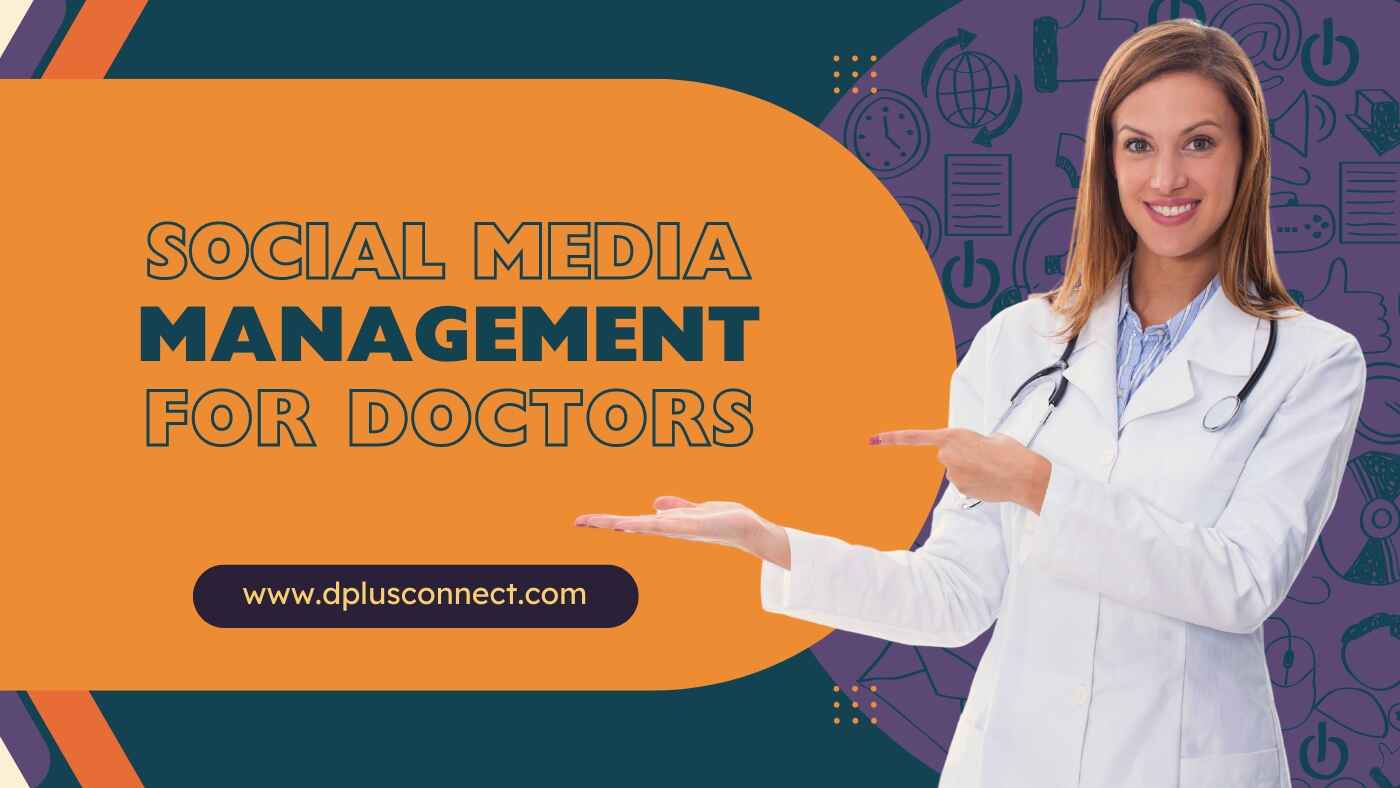Social Media Management for Doctors
In today’s digital age, social media has become a powerful tool for doctors, hospitals, clinics, and medical professionals to reach a wider audience, build trust, and establish their expertise. At D Plus Connect, we specialize in providing comprehensive digital marketing services tailored for the medical field, and we understand the importance of personal branding for doctors. In this blog post, we delve into “Social Media Management for Doctors” and offer valuable insights and tips to help you confidently manage your social media presence.

1.
Choosing the Right Social Media Platforms
Selecting the appropriate social media platforms is crucial for effectively reaching your target audience. Here are some popular platforms and their benefits for doctors:
- Facebook: With a vast user base, Facebook is ideal for sharing health tips, clinic updates, and engaging with a broad audience through posts and live Q&A sessions.
- Twitter: Great for sharing quick updates, news, and participating in medical discussions using hashtags.
- Instagram: Perfect for visual content such as patient success stories, infographics, and short educational videos.
- LinkedIn: Useful for professional networking, sharing research, and connecting with other healthcare professionals.
2.
Crafting an Engaging Social Media Strategy
An effective social media strategy helps in creating content that resonates with your patients while maintaining professionalism and adhering to ethical guidelines:
- Content Planning: Develop a content calendar to ensure consistent posting. Mix educational posts with personal insights and patient stories.
- Engagement: Respond to comments and messages promptly. Engaging with your audience builds trust and credibility.
- Visuals: Use high-quality images and videos to make your posts more attractive and shareable.
3.
Building a Strong Online Reputation
Managing your online reputation involves proactively handling reviews and patient feedback:
- Monitoring Reviews: Regularly check platforms like Google My Business, Yelp, and Facebook for new reviews. Respond professionally to both positive and negative feedback.
- Encouraging Reviews: Ask satisfied patients to leave reviews. Positive testimonials can significantly enhance your online reputation.
- Addressing Criticism: When dealing with negative feedback, acknowledge the issue, and offer a solution or a private conversation to resolve the matter.
4.
Utilizing Social Media for Patient Education
Social media is an excellent tool for patient education and disseminating accurate medical information:
- Informative Posts: Share posts that educate patients about common health issues, preventive care, and treatment options.
- Myth Busting: Use your platform to debunk common medical myths and provide evidence-based information.
- Live Sessions: Host live Q&A sessions to answer patient queries in real-time and address common concerns.
5.
Enhancing Patient Communication
Improving communication through social media can enhance patient satisfaction and engagement:
- Health Tips: Regularly share health tips and wellness advice tailored to your audience.
- Interactive Content: Use polls, quizzes, and stories to interact with your followers and make your content more engaging.
- Direct Messaging: Offer a channel for patients to ask non-urgent questions, book appointments, or seek advice.
6.
Managing Privacy and Confidentiality
Maintaining patient privacy and confidentiality is paramount when using social media:
- HIPAA Compliance: Ensure all your social media activities comply with HIPAA regulations. Avoid sharing any personal patient information without explicit consent.
- Professional Boundaries: Keep personal and professional accounts separate to maintain clear boundaries.
- Privacy Settings: Regularly review and update your privacy settings on all social media platforms to protect your information.
By effectively managing your social media presence, you can connect with patients, establish yourself as a trusted medical professional, and enhance your medical practice. Stay tuned for more insights and tips from D Plus Connect on leveraging digital marketing to grow your healthcare business.

FAQ
Why is social media important for doctors?
Social media allows doctors to reach a wider audience, build trust with current and potential patients, share valuable health information, and establish their expertise in the medical field. It also offers a platform for patient education and improved communication.
Which social media platforms should doctors use?
Doctors should consider using Facebook for its broad audience reach, Instagram for visual content, Twitter for quick updates and medical discussions, and LinkedIn for professional networking and sharing research.
How can doctors create engaging content on social media?
Doctors can create engaging content by mixing educational posts, patient success stories, health tips, and personal insights. Using high-quality images and videos, and responding promptly to comments and messages, also helps in engaging the audience.
How can doctors manage their online reputation?
Doctors can manage their online reputation by regularly monitoring reviews on platforms like Google My Business, Yelp, and Facebook. Responding professionally to both positive and negative feedback, and encouraging satisfied patients to leave reviews, are also important steps.
What should doctors do to ensure patient privacy on social media?
Doctors should ensure all social media activities comply with HIPAA regulations, avoid sharing personal patient information without consent, keep personal and professional accounts separate, and regularly update privacy settings on social media platforms.
How can social media be used for patient education?
Doctors can use social media for patient education by sharing posts that provide accurate medical information, debunking common myths, and hosting live Q&A sessions to address patient queries and concerns in real-time.
How often should doctors post on social media?
Consistency is key. Doctors should aim to post regularly, whether that’s daily, a few times a week, or weekly, depending on their schedule and the platform. Developing a content calendar can help maintain a consistent posting schedule.
What kind of content should doctors avoid posting on social media?
Doctors should avoid posting any patient-specific information without explicit consent, unverified medical information, overly personal opinions that might conflict with professional image, and content that could be perceived as unprofessional or controversial.
How can doctors handle negative feedback on social media?
Doctors should address negative feedback professionally and empathetically. Acknowledge the issue, offer a solution, and if necessary, move the conversation to a private channel to resolve the matter without violating patient privacy.
Can social media improve doctor-patient communication?
Yes, social media can improve doctor-patient communication by providing a platform for answering common queries, sharing health tips, and offering timely updates about the practice. It allows for more accessible and interactive engagement with patients.

